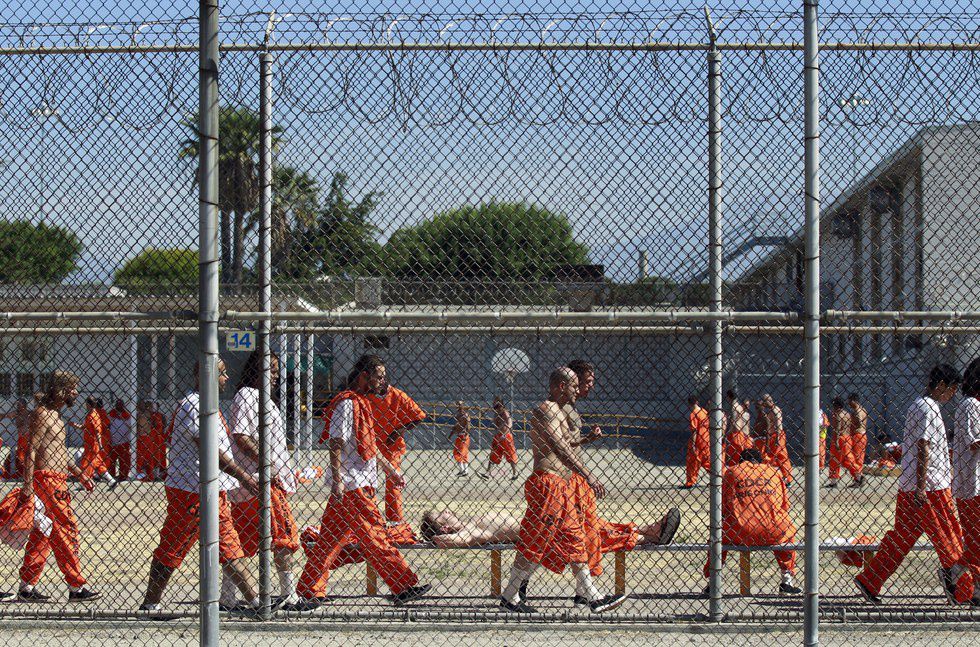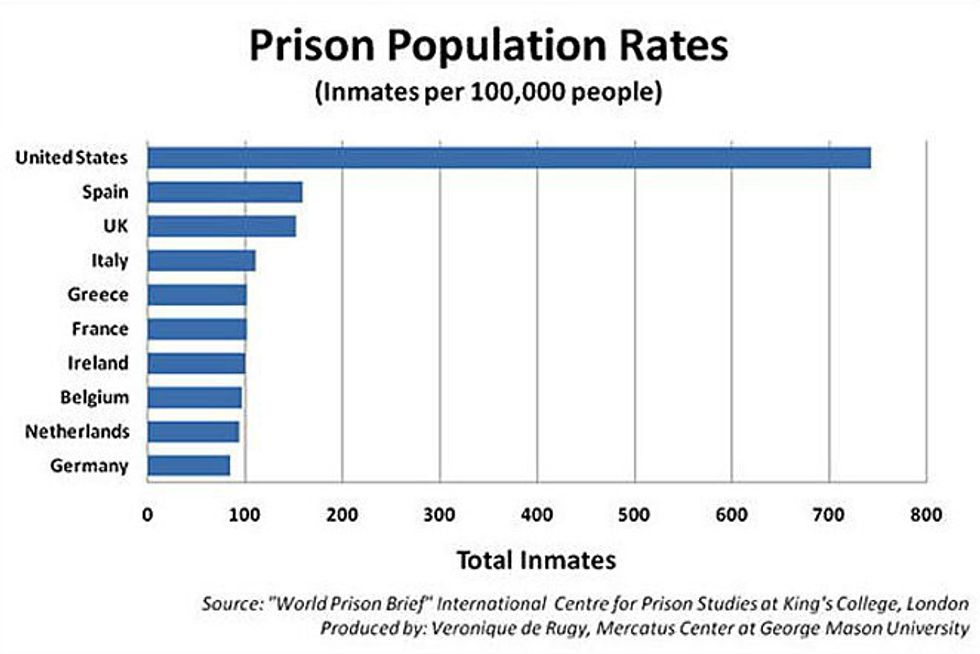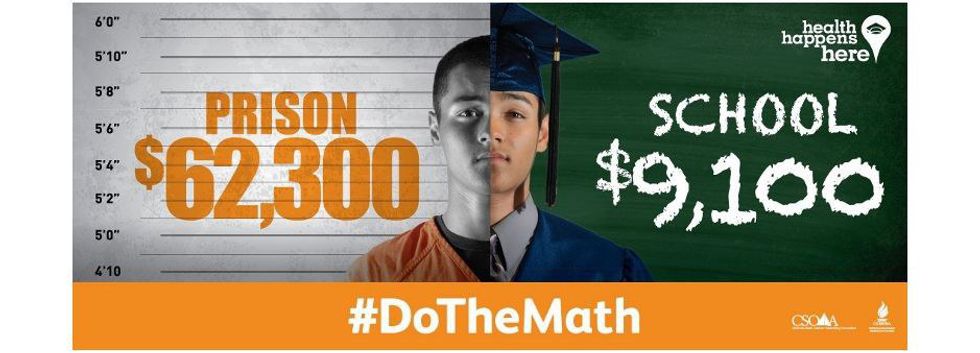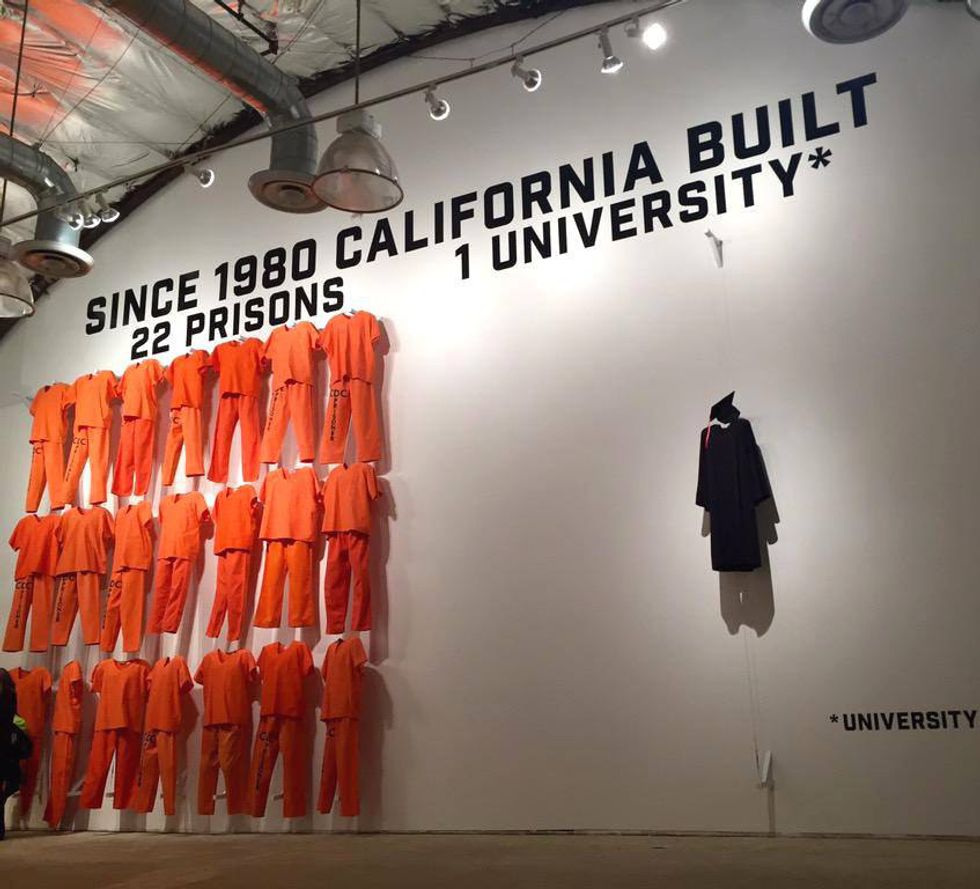Ahhh, the smell of dollar store laxatives and remnants of cocaine lightly line the air. Ferocious rays climb the crumbling brick, the world is awakening, yet they are confined. Abuse, neglect, confinement, rock, flag and eagle. The sound of America's greatest past time, Prison, chimes.
1. The United States has the highest prison population in the world
724 of every 100,000 people are in U.S.A prison systems. Currently, close to 2.3 million individuals are stuck in various privately owned and government ran prisons.
2. "Federal law currently requires a mandatory minimum sentence of five years for a first-time, non-violent drug offense"
Yates noted that half the federal prison population is serving time for drug offenses. And 55% of those are serving sentences of more than 10 years."While we believe finality in sentencing should remain the general rule, and with public safety our foremost goal, we also recognize that sentences imposed for some drug defendants under the current sentencing guidelines are longer than necessary,'' Yates told the commission. "And this creates a negative impact upon both the public's confidence in the criminal justice system and our prison resources."
Over half of current inmates are there solely for personal non-violent drug charges. Mandatory minimum sentence means regardless of what a judge says, there is a mandatory minimum which must be met when dealing with the breaking of federal law (in regards to drugs). The issue with this ridiculous law is many. Number one, cannabis is on a list of federally illegal drugs (meaning our government has literally said a plant is illegal, the forbidden fruit, listening to authority, yea, anyways) weed is illegal still on a federal level, regardless whether or not a state itself has legalized the delicious green goddess itself. This particular law ultimately means, the crime is solely punishable if caught, whereas when people commit actual crimes, they are investigated. You know like raping, murdering, robbing someone.
Either make all drugs, substances, etc legal, or only make beneficial substances legal. There cannot continue to be this bullshit of "here's your mojito, miss" while you shovel fake fucking food down your throat, condemning a plant. Let's stop pretending like we don't inhale, consume, and bathe in billions of harmful chemicals on a daily basis. There is very clearly a disconnect with the law representing actual humanity. The law first off doesn't exist (that is an article for another day). Secondly, there is an overwhelming amount of dangerous substances that are perfectly legal, just look at mcgriddles and vodka. There is clearly no real issue or concern of safety. We even say it is legal in this country to inflict terrorism on protesters. Lastly, a world where the destruction of alcohol is advocated for and supported by schools and law enforcement, while billboards of "hopin' you're not dopin'" lines the hallways, is a world then infested with a severely confused and manipulated populous.
The illegality of cannabis is outrageous, an impediment to full utilization of a drug which helps produce the serenity and insight, sensitivity and fellowship so desperately needed in this increasingly mad and dangerous world.Number two, all drugs should be legal. We eat fake fucking food for fuck-sakes. how about we all stop pretending like we don't consume, inhale,and bathe in billions of chemicals every day. Who cares what another person does to their own bodies (as long as it causes no direct harm to another person) and even then in that instant we do not care. We consume fake food which reaps the resources of others, has killed, displaced communities, so actually many legal things in which we think is our own personal consequence has damaged many others. Ya know what has never killed anyone? Weed. -Carl Sagan
3. Twenty-two percent of U.S.A prisons are private
Our government makes contracts with privately owned and ran prisons, which are for-profit businesses, ultimately meaning both the prison industry and the government profit literally from people's crimes, the victims' pain (even death), mental illness, false accusations, and overall lack of well being. While people are in positions of severe vulnerability, both the government and private corporations prey, hoping to feast on their demise.
The profits for these corporations are fueled copiously by the suffering of victims. Although crimes and wrongdoing must be committed to create a potential for incarceration, instances where the wrongdoer is being prosecuted means a victim must exist. Through that, reaping heavily from those experiencing inflicted pain, even loss of their and others lives, creates a disgusting means of attaining fiscal stability.
Not to mention, that according to the Bureau of Justice, over 70% of those incarcerated within the United States are suffering from one or more mental illnesses. Now time for a rant, confining individuals, first off, for minor crimes (not actually crimes, just bullsh*t laws) is absolutely ridiculous, then to tack on the notion that many of these individuals within prisons are there for minor offenses, while having a mental illness in which they receive no treatment for, is in no way view-able as productive. Essentially, they are fish that the sharks have caught. However, they must remember, fish are friends, not food.
The vast majority of the individuals are not violent criminals—most people in jails are have not yet gone to trial, so they are not yet convicted of a crime. The rest are serving short sentences for minor crimes. Once in jail, many individuals don't receive the treatment they need and end up getting worse, not better. They stay longer than their counterparts without mental illness. They are at risk of victimization and often their mental health conditions get worse. After leaving jail, many no longer have access to needed healthcare and benefits. A criminal record often makes it hard for individuals to get a job or housing. Many individuals, especially without access to mental health services and supports, wind up homeless, in emergency rooms and often re-arrested. At least 83% of jail inmates with a mental illness did not have access to needed treatment. - See more at: http://www.nami.org/Learn-More/Public-Policy/Jaili...
Allowing private companies be responsible for inmate's lives is detrimental to both the individual themselves and the society around them. There have been outstanding accounts that have either endured or witnessed gross levels of violence and neglect, which have been linked to future aggression and worsening of current mental illness. The worsening of the individuals' state, along with new added barriers fosters anxiety, depression, and angst back into society and within the personal mind of the person.
Jailing people with mental illness creates huge burdens on law enforcement, corrections and state and local budgets. It does not protect public safety. And people who could be helped are being ignored. - See more at: http://www.nami.org/Learn-More/Public-Policy/Jaili...
4. There are more prisons than colleges in the USA
However, prison costs over 5x the rate of funding a child through secondary education. Just a side note, there are also more McDonald's than schools, as well.
5. "Incarceration costs taxpayers almost $70 billion annually."
As a country, there is simply no way for necessary resources to be free. There are millions of various people around the world that still must be massacred, and by spending actual tax dollars to providing is a sustainable, ethical life is simply absurd. When the resources are finally reaped, the people finally murdered, obese, or in states of hardening mental retardation, then and only then ,Jebediah, can we think in regards to humanity.
6. "State spending on corrections has grown about 300 percent in just the past 20 years."
Doug McVay, Vincent Schiraldi, and Jason Ziedenberg found that by providing drug treatment in comparison to incarceration would save billions in tax dollars. The group found current practical system within Maryland where drug offenders actually receive treatment rather than jail time. Jail time also has no evidence of being effective in correcting unethical behavior (might be because over half of inmates are not guilty of unethical behavior; too bad the law does not recognize, nor reflect ethics).
Treatment as an alternative to incarceration is already saving money for the state of Maryland. As recently summarized by the Maryland State Commission on Criminal Justice Sentencing, the state of Maryland has alternative to incarceration programs that both focus on “back-end” treatment (i.e., assigned after some prison time has been served) or "exit," such as the Community Options Programs (COP) including regimented offender treatment centers, day reporting, intensive supervision, and home detention, and graduated sanctions for program failures. Baltimore City offers a front-end (i.e., initial sentence) diversionary program through its Drug Treatment Court. Looking at these programs as a whole, the Sentencing Commission writes that “Maryland's use of alternative sanctions has reduced the annual cost to house an offender from $20,000 to $4,000.”
If money must be used within our society, responsibilities to the well being of our planet and people must come first over greed. Privately owned businesses should not in any capacity have access or authority over inmates, drug reform is a necessity, and treatment over incarceration is both safer and more effective. By urging our government to end all potential and current contracts with private businesses, while pushing and educating about drug reform, we as a community can begin to develop new concrete ideas for completely changing our prison system and society.






















